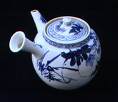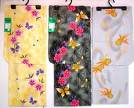![]() Numbers かず(数)
Numbers かず(数)
You should already know the numbers up to one hundred, but now we’ll pick up from there.
You will use ひゃく(百)if there are exactly 100 of something. For example, かみがひゃくまい(かみが百枚)means 100 pieces of paper (thin/flat objects use this counter), and がくせいがひゃくにん(学生は百人)means 100 students (with the counter for “people”).
If there are exactly 100 or 1000 of something, then the “1” is not stated, and you will just say ひゃく(百)for 100, and せん(千)for 1000. Also remember that in Japanese FOUR places are used for counting (instead of THREE in English) so the actual “unit” does not change until 10,000 which is one “man” or いちまん(一万)。See the previous section on money in Japan in this unit to review this information.
Let's look at the numbers beyond 100. Listen and watch. Click Play to hear each number in Japanese.
You will notice that most of the numbers are pretty easy (just the number in front of the counter) but as is true with all Japanese counting, there are some irregularities in pronunciation and spelling with certain numbers. In this case, 3,000 and 8,000 are slightly irregular. Be sure to pay attention to their forms below.
NOTE: for 300, 600 & 800 (*) , the sound changes slightly to さんびゃく(三百)、ろっぴゃく(六百)And はっぴゃく(八百)。Remember that the “sound” is reflected in the Hiragana spellings for each, and you SHOULD practice and remember these.
NOTE: for 3,000 and 8.000, the sound changes slightly to さんぜん(三千)And はっせん(八千)。
| 100
|
ひゃく(百) |
| 200
|
にひゃく(二百) |
| 300
|
さんびゃく(三百)* |
| 400
|
よんひゃく(四百) |
| 500
|
ごひゃく(五百) |
| 600
|
ろっぴゃく(六百)* |
| 700
|
ななひゃく(七百) |
| 800
|
はっぴゃく(八百)* |
| 900
|
きゅうひゃく(九百) |
| 1,000
|
せん(千) |
| 2,000
|
にせん(二千) |
| 10,000
|
いちまん〔一万〕 |
![]() How many are there? いくつありますか。
How many are there? いくつありますか。
In this writing practice activity, you will practice saying how many different items there are in the shop. Look at the images and the number given and then say that you there are that many of the item in the shop.
Click each picture to check your answer. As with all activities you should note and practice Kanji provided in the examples as you study.
Please note that we use ~そく〔~足〕for shoes and socks, and ~まい〔~枚〕for clothing.
| 200 | おゆのみ(お湯呑み)がにひゃくこ(二百個)があります。 Counter:こ(個) |
|
| 300 | ぞうり(草履)とげた(下駄)がさんびゃくそく(三百足)があります。 Counter:ぞうく(足 |
|
| 150 | きゅうす(急須)がひゃくごじゅうこ(百五十個)があります。 Counter:こ(個) |
|
| 400 | ゆかた(浴衣)がよんひゃくまい(四百枚)があります。 Counter:まい(枚) |
|
| 1.000 | ほうせき(宝石)がせんこ(千個)があります。 Counter:こ(個) |
|
| 800 | イヤリングがはっぴゃくこ(八百個)があります。 Counter:こ(個) |
![]() Review and Practice
Review and Practice
As we wind up this unit and you prepare for the section quiz and unit exam, let’s see if you can remember what we’ve learned. Be sure to go back through the sections to practice making comparisons and conjugating the past tense of verbs. Also be sure to review numbers beyond one hundred and how to bargain at a market, as well as all other unit vocabulary related to shopping.
Write how you would express the following. When you finish, click each question or item to see if you are correct.
| 100 books | ほん、ひゃくさつ(本、百冊) |
| 200 houses | うち にひゃっけん(家、二百軒) |
| 550 potteries | やきもの、550こ(やきもの、五百五十個) |
| 600 plates | おさら、ろっぴゃくまい(お皿、六百枚) |
| 1.000 umbrellas | かさ、せんほん(傘、千本) |
Now, imagine that you want to express the following. How would you do this in Japanese? Use what you have learned in this Unit.
| How much is the necklace? | ネックレスは、いくらですか。 |
| Can I see the bracelet? | ブレスレットを みせてください。(ブレスレットを見せて下さい。) |
| Do you have a cheaper one? | もっとやすいのが ありますか。(もっと安いのが ありますか。) |
| This pottery is of very good quality. | このやきものは こうきゅうです。(この焼き物は、高級です。) |
| How may I help you? | なにに いたしましょうか。(何に 致しましょうか。) |
| What size do you wear? | サイズは なにですか。(サイズは、何ですか。) |
| I prefer loose fitting pants. | ゆったりしたズボンがすきです。(ゆったりしたズボンが 好きです。) |
| I like to shop. | かいものに いくのが すきです。(買い物に 行くのが 好きです。) |
| Do you want to go shopping? | かいものに いきたいですか。(買い物に 行きたいですか。) |
| I like to save money. | おかねを ためるのが すきです。(お金を 貯めるのが 好きです。) |
| I pay in cash. | おかねで はらいます。(お金で 払います。) |
| Are you using a credit card? | クレジット・カードを つかいますか。(クレジット・カードを 使いますか。) |
| The saleslady is in a good mood. | てんいんは、きげんがいいです。(店員は、機嫌が いいです。) |
| The saleslady helps me. | てんいんは、てつだってくれます。(店員は、手伝ってくれます。) |
| The client is worried. | きゃくは しんぱいしています。(客は、心配しています。) |
| The man is irritated. | あのおとこのひとは、イライラしています。(あの男の人は、イライラしています。) |
| The teacher is tired. | せんせいは つかれています。(先生は、疲れています。) |
Write the counter that would go with these nouns:
| houses | ~けん (~軒) |
| books | ~さつ(~冊) |
| apples | ~こ(~個) |
| plates | ~まい(~枚) |
| umbrella | ~ほん、~ぼん、~ぽん(~本) |
Write these sentences in the past tense.
| I went to school. | がっこうに いきました。(学校に 行きました。) |
| I wanted to study. | べんきょうしたかったです。(勉強したかったです。) |
| You could swim. | およぐことが できました。(泳ぐことが 出来ました。) |
| You put on a table. | テーブルに おきました。(テーブルに 置きました。) |
| We did homework. | しゅくだいを しました。(宿題を しました。) |
| You didn’t feel well. | きぶんが わるかったです。(気分が 悪かったです。) |
| They told the truth. | ほんとうのことを いいました。(本当の事を 言いました。) |
| She was a teacher. | せんせいでした。(先生でした。) |
| She was well. | げんきでした。(元気でした。) |
![]() Listening Preparation
Listening Preparation
You will complete an assignment using the recordings below. Listen to each recording to prepare to spell out any numbers and write the sentence that you hear.
![]() Graded Assignments
Graded Assignments
Please return to the Section 3 Tasks & Assignments folder to complete the graded assignments for Section 3, Part C.







